“She’s just That Wumman!”
That’s what Scottish variety actor Alan Steel lands on, giggling, as he tries to define theatre’s most indefinable character – the pantomime dame.
And as anybody who’s ever seen one will know, he’s absolutely spot on.
Panto season is back with a bang – oh, yes it is! – and Shakespearean actor Alan, who has played the dame at St Andrews’ Byre Theatre for the past 11 years, is gearing up to don a frock again this Christmas in Snow White.
But as he and every other panto dame out there knows, there’s so much more to the role than a bloke in a dress.
“To me, the main ingredient for a dame is warmth – it’s not just trusting that you’re going to put on a frock and be funny,” Alan, 58, warns.
“But the thing is, you could go round the length and breadth of Scotland and England and find all sorts of different dames, and everyone has their own flavour.”
‘Fishwife’, ‘mammy’, ‘maneater’ and ‘wildcard’ are all flavours favoured by Courier Country’s dames – including Alan, as well as Perth Theatre stalwart Barrie Hunter, viral comedian and new MacRobert Arts dame Brian James O’Sullivan (AKA Brido Hingwy) and dentist-by-day, dame-by-night Tom Richmond at Dundee’s Thomson-Leng Musical Society.
But whether she’s the princess’s well-meaning nanny, an endearingly out-of-touch queen or an outrageous cougar on the prowl (hello Widow Twankey), it seems the dame always echoes ‘that wumman’ from our own lives we all know and love – and love to laugh at.
What’s in a dame?
For Barrie Hunter, who has played the dame at Perth Theatre every year since 2011, the role is a pretty powerful one.
“I just fell in love who the role can be, and what you’re allowed to do, where other characters on that stage can’t so much,” he explains.
“You know, the direct address to the audience and, very often, just being the cheeky one!”
Breaking the fourth wall – or, in Alan’s words, having “absolutely no fourth wall in sight” – is one of the privileges of the panto dame which sets her apart from other characters, allowing her to slip between the fantasy world of the story and the real world of the audience.
Unlike pantomime’s other ‘stock’ characters like the princess, the prince and the baddie, which have their roots in the 16th Century Italian tradition of ‘comedia dell’arte’ (improvised street comedies), the dame is an invention entirely unto herself.
She combines theatrical elements from the ancient Greek chorus to burlesque and vaudeville, and out comes a character which is somehow both cartoonish ringmaster and earnest caretaker all at once.
But with great power comes great responsibility, and Barrie admits that before he entered the world of damehood, he was intimidated by how much of panto rests on those puffy, padded shoulders.
“They can, very often, make or break the show, in terms of the storytelling and where the energies are pitched,” he observes.
‘Brido Hingwy’ to enter pantoland
And it’s true – with her risque jokes, wink-wink-nudge-nudge references and wry remarks, she is, as Thomson-Leng’s Tom points out, what the adult component of a panto audience is there for.
“The princesses, for instance,” he says, “are there for the kids, for the story.
“But as the dame, you’re kind of the audience’s eye into the story, because you talk to them whereas the other character don’t. You’re like their window into that pantoland world.”
It’s a big job, filled with big hair and big shoes. For Brian James O’Sullivan, better known as online comic Brido Hingwy, the pressure is on as he takes to the MacRobert Arts Centre stage as this year’s dame.
But luckily, the actor knows his dame will be a hit – as she’s already gone viral.
Auntie Janice, a gossipy Glaswegian alter ego he invented over a series of lockdown comedy videos, stole the hearts of Scots everywhere.
Now she’s going from everybody’s auntie to Maw Goose, and for Brian, the progression is natural – if not inevitable.
“When I started doing the videos, the character of Janice emerged, and really the first thought I had when that happened was: ‘I want to bring this character to the stage’,” says 37-year-old Brian, who has been acting professionally for 15 years, but shot to fame thanks to his lockdown comedy videos.
“It seemed a logical conclusion that one day Janice would be a panto dame, because I’m not really changing that much about her character, you know?
“She’s a fishwife-type character, she loves a gossip, but she’s really good-hearted and moralistic, and that just works really well for a dame.”
Indeed, the key to the dame seems to be that balancing act of silly and serious, levity and love.
When asked which three ingredients every dame needs, all four actors listed the first two as comedic skills – “sass”, “jokes”, “a sense of the ridiculous” etc – but each included that strong moralistic centre as their third.
Barrie called it “compassion”; for Tom, it was “relatability”. And both Alan and Brian summed it up with the same word: “heart”.
(Everybody say “awww!”)
Brownies from the Brownies
That “heart” is what gives panto that warm-and-fuzzy Christmas feeling that you just can’t get anywhere else.
And the affection that dames evoke from audiences is for life, not just for Christmas – as Arbroath dentist Tom has discovered!
The 39-year-old is coming up for his eighth year as the dame in amateur musical society Thomson-Leng’s panto, and one of the highlights for him is the relationship he’s struck up with die-hard panto-goers over the years.
“There’s a stupid joke that I’ve been doing ever since the first time I played a dame, where, when the Brownies come to see us, I always ask them if they’ve brought me brownies,” he laughs.
“And then I think it was about year four or five, they actually brought me brownies! I was completely blown away and shocked.
“Now they usually bring me brownies every year, so I’m hoping to get some this year.”
Indeed for many children, panto is their first experience of theatre – and for many, the only one they’ll get.
For ‘Auntie Janice’ (Brian), the ability to imprint on the memories of little ones is a privilege.
‘Whatever your gender comes out as, that’s cool’
“Really young kids experience panto where they might not experience anything else in the theatre,” Brian observes.
“So it’s a chance for us to show young kids that it’s cool to be whoever you are – if that’s outrageous or quiet or scared or cheeky.
“And,” he adds, “whatever your gender comes out as, that’s cool as well. I think we have a unique opportunity to open wee eyes to that stuff and make it all OK.”
It’s true – the dame has always been linked alongside queerness, and in a 2022 where gender fluidity is no longer confined to the ridiculous realm of panto, and drag is being taken more seriously as an art form, she has powerful – and possibly polarising – potential.
But although she could be compared to, as Tom puts it, “a more approachable version of drag”, it’s clear from speaking to all four dames that the difference between a dame and a drag queen is that the former tends to have her tongue firmly in her cheek about the ‘fact’ she’s a woman.
“You have to be very careful how you approach this, as in the current climate there are so many people with so many strong opinions on gender and drag,” says Perth dame Barrie, who tends to play a fairly gruff, masculine dame.
“Certainly my take on the dame, and I can only speak for myself, is categorically: There’s a man in there.
“I like to play it in that way that I’m getting away with it – you know, I’ve pulled the wool over the audience’s eyes and they think I’m a woman.
“And I think there’s a lot of fun to be had with that. But I genuinely don’t try to over-analyse it because I think that way madness lies.”
For the Byre’s Alan, the difference is less in the end result and more in the intention: “If I was a drag queen, I would be a drag queen, you know? I think drag is a vocation, whereas the dame to me is a character.
“Don’t get me wrong – she must be in there, if she’s going to come out! But to me, it’s a role. I’ll do different roles all through the year, but then come Christmas, there she is!”
But for Brian, who prefers going “femme and high glam”, there’s no real need to define a difference – unless you want to.
“It’s great fun to watch a dame cutting about in Caterpillar boots and hairy legs, and then the way I’m doing it is kind of the other end of the scale,” he explains, “more like Danny La Rue, or a strong female impersonator.
“I think for some people who keep it quite traditional, it can be kept separate.
“But I think we’re living in a world where things have changed in such a beautiful way, in terms of people’s gender journeys and gender expression, that we’re wise to let that bleed into panto,” he explains.
“I feel like it’s not so much me pretending to be a woman, as me leaning into my feminine energy which I have anyway – and it’s OK for me to have that. I didn’t know that growing up.”
‘Battering Flumps out into the void’
And while some may worry that evolving conversations around gender identity could lead to panto damehood becoming outdated or being phased out, others are more optimistic.
After all, pantomime itself has proven to be robust in the face of 300 years of social change.
Despite audiences dropping by around one-third last year compared to pre-pandemic levels, the appetite for a Christmas panto is still visibly strong in Tayside and Fife.
One reason for that, Tom reckons, is the fact panto is, unlike touring theatre shows, unflinchingly local.
“What I like about panto is that you can take a script that’s been done somewhere else, but change it to be more local,” he says.
“So I don’t know where [Thomson-Leng’s] script’s come from, I think it’s an English script, but we’ve added in a lot of local Tayside/Dundee jokes and references.
“So it’s always changing, it’s never boring – you make it up to date, you make it local for people.”
And as a panto writer as well as dame, Barrie adds that although panto is relatively light and unserious, the set structure of it allows him to slot in messages and moments that chime with current events – like white mountain hares seeking refuge in the village after their snowy homes melt away in this year’s Jack and the Beanstalk.
“I think you have to move with the times, and you can be quite subversive with panto, quite topical with it.
“And without it becoming horribly preachy, you can get messages across.
“There’s big universal themes of love and kindness, and I like to try and throw in, for example, environmental issues.”
But the fun of panto is that some dame things really never change – like the song sheet, fart gags, and of course, much-anticipated sweetie throw.
“I’m delighted to report that I’ve had it OK’d to reinstate the sweetie chuck-out this year!” laughs Barrie.
“Last year (after Covid) it was a health and safety disaster, but I will once again be battering Flumps out into the void, for people to catch and do with what they will.”
It’s the type of statement that has you nodding along, before realising there’s nothing quite like a Christmas panto.
And one thing shines out from all four actors, despite their different takes, styles and backgrounds: whether she’s “mischievous and man-eating”, or “gross and flatulent with a good heart”, there really is absolutely nothing like a dame.
See Snow White at The Byre from Dec 1-31; Maw Goose at MacRobert Arts Centre from Dec 2-31; Jack and the Beanstalk at Perth Theatre from Nov 25 – Dec 31, and Frosted at the Gardyne Theatre from Nov 29 – Dec 4.
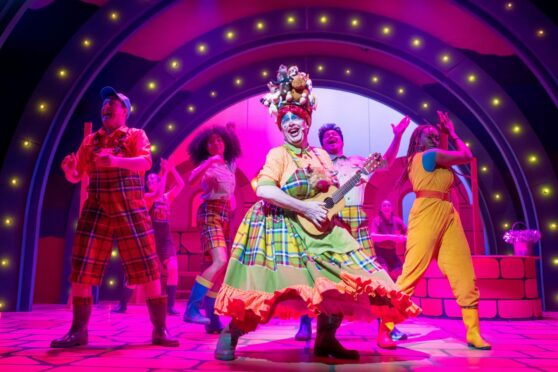
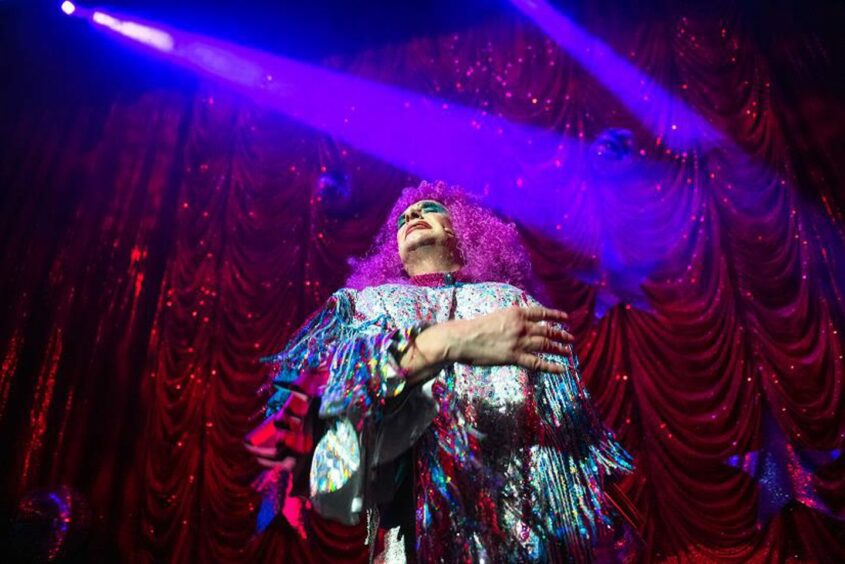
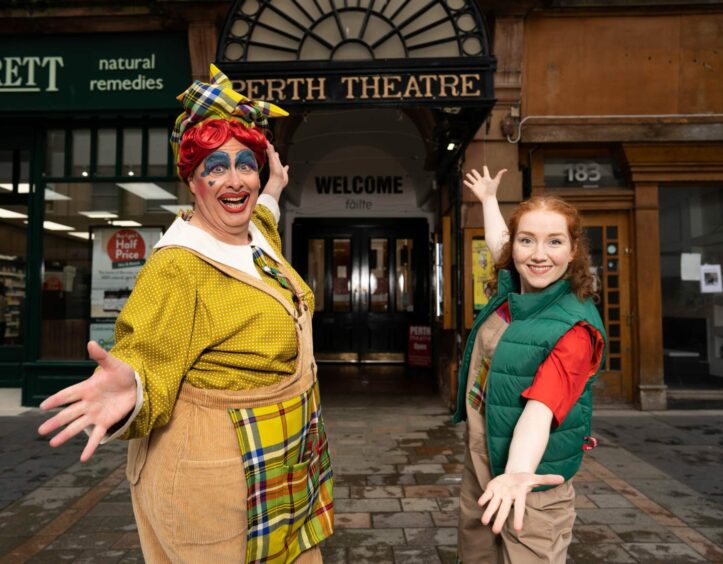
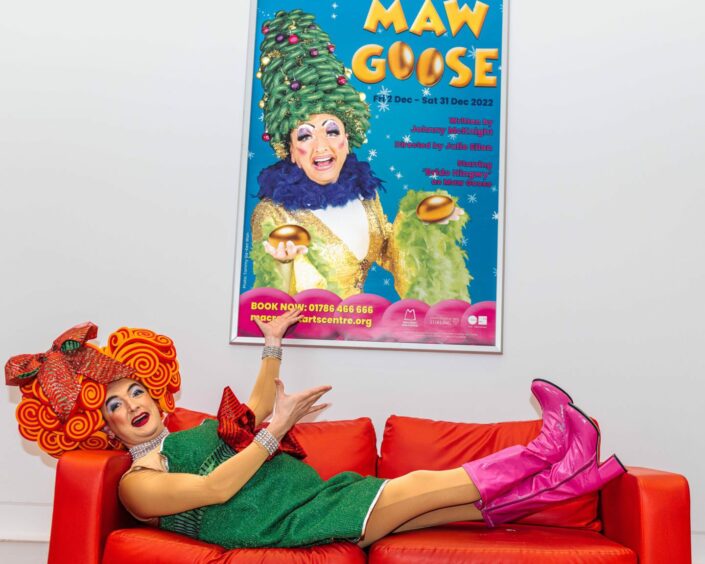
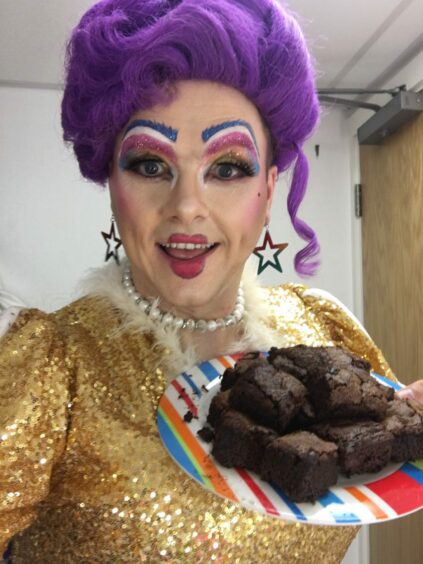
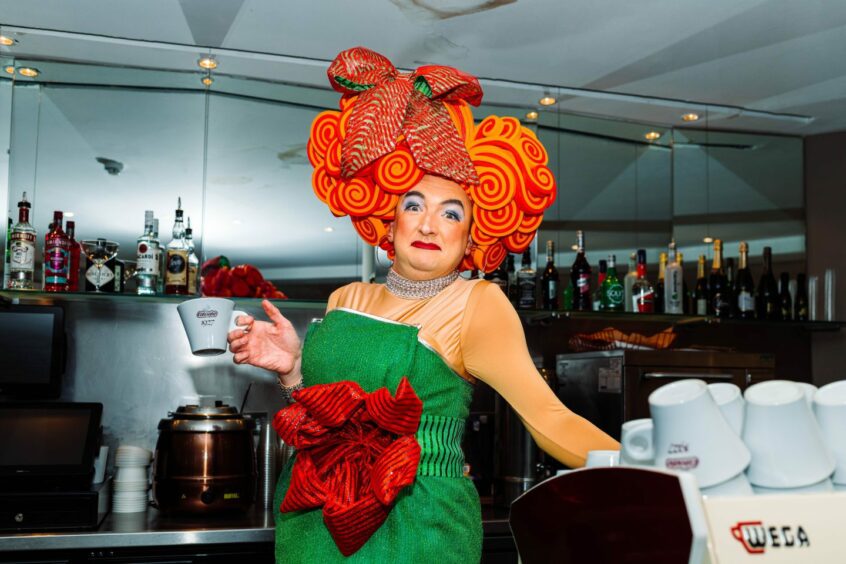
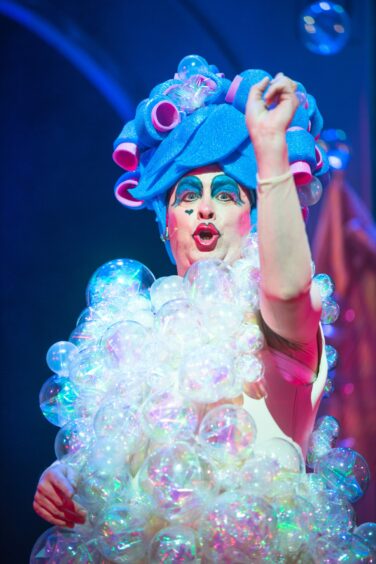
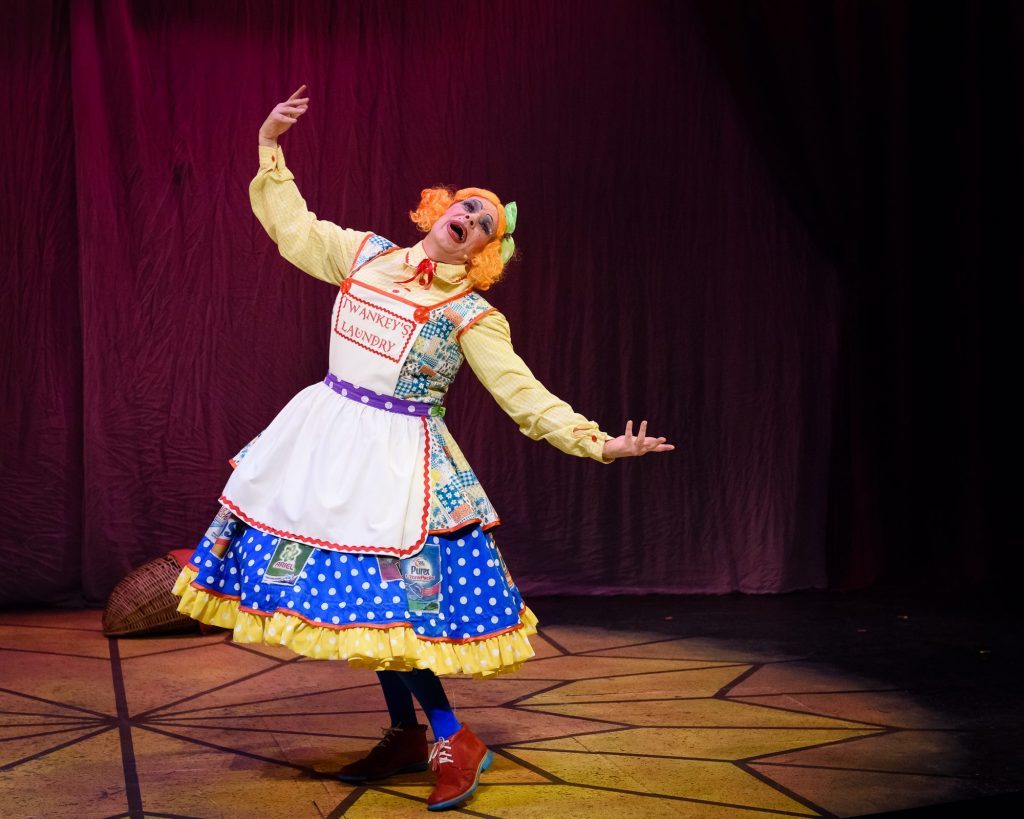
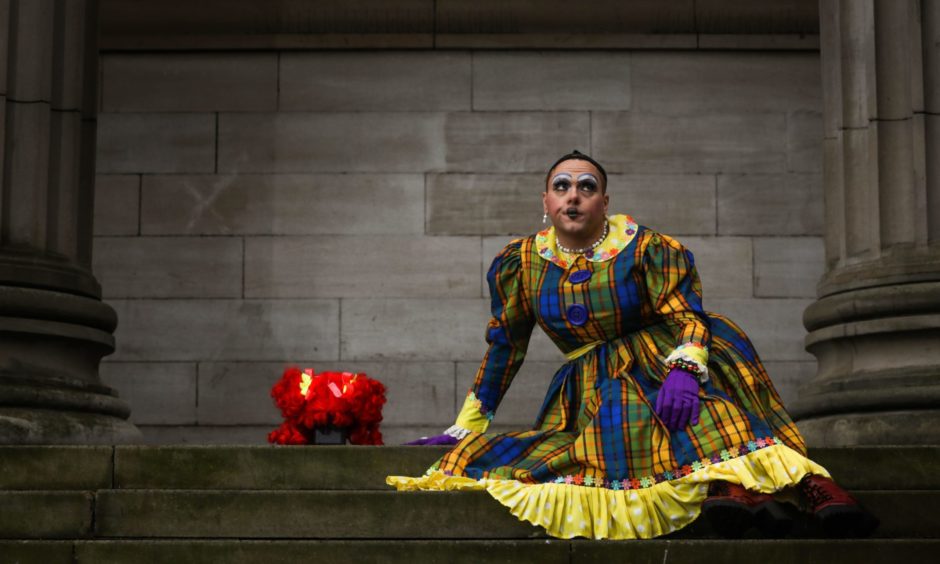
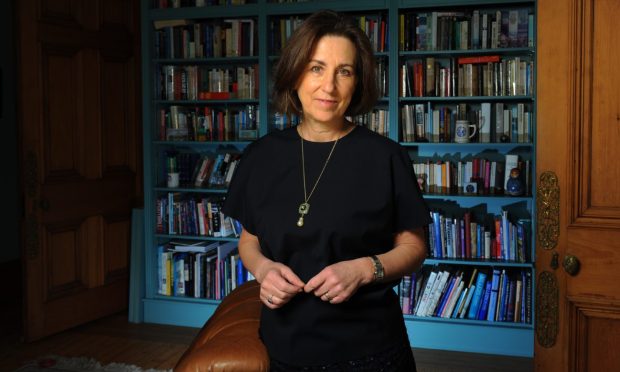



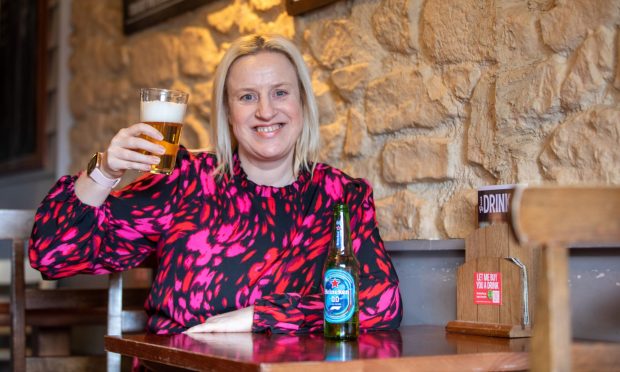
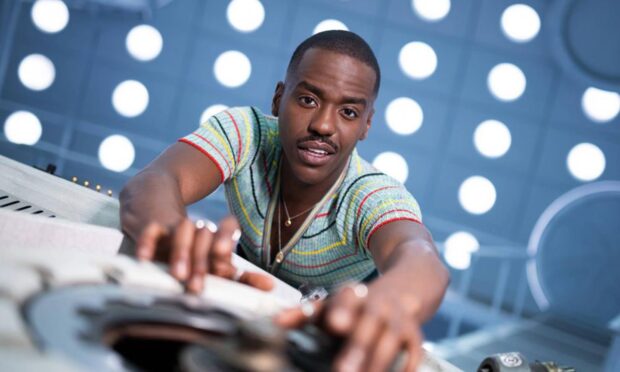

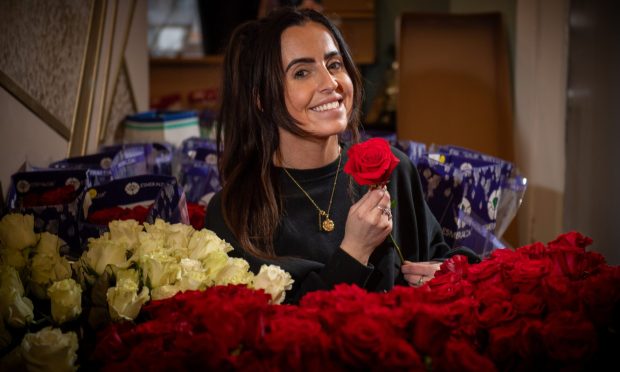
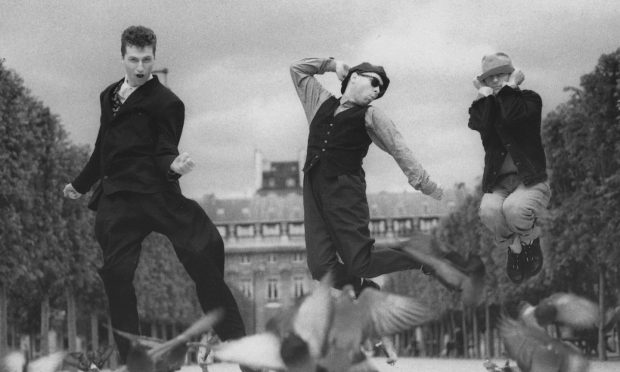

Conversation